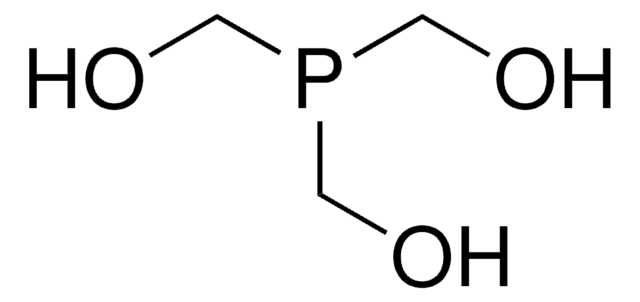245275
Triethylphosphine
99%
Synonym(s):
Triethylphosphorus
About This Item
Recommended Products
Assay
99%
form
liquid
reaction suitability
reagent type: ligand
reaction type: Arylations
refractive index
n20/D 1.456 (lit.)
bp
127-128 °C (lit.)
density
0.802 g/mL at 20 °C (lit.)
functional group
phosphine
SMILES string
CCP(CC)CC
InChI
1S/C6H15P/c1-4-7(5-2)6-3/h4-6H2,1-3H3
InChI key
RXJKFRMDXUJTEX-UHFFFAOYSA-N
Looking for similar products? Visit Product Comparison Guide
Related Categories
Application
- Synthesis of the tetrahedrally coordinated L3Fe-Nx complex with a terminal nitride group.
- Synthesis of (PEt3)2Ni(η2-C14H10), a source of the reactive Ni(PEt3)2 moiety.
- Synthesis of dinuclear rhodium complexes with triethyllphosphane bridges.
Other Notes
related product
Signal Word
Danger
Hazard Statements
Precautionary Statements
Hazard Classifications
Eye Dam. 1 - Pyr. Liq. 1 - Skin Corr. 1B
Storage Class Code
4.2 - Pyrophoric and self-heating hazardous materials
WGK
WGK 3
Personal Protective Equipment
Certificates of Analysis (COA)
Search for Certificates of Analysis (COA) by entering the products Lot/Batch Number. Lot and Batch Numbers can be found on a product’s label following the words ‘Lot’ or ‘Batch’.
Already Own This Product?
Find documentation for the products that you have recently purchased in the Document Library.
Customers Also Viewed
Our team of scientists has experience in all areas of research including Life Science, Material Science, Chemical Synthesis, Chromatography, Analytical and many others.
Contact Technical Service








